ABOUT
Schwabing-WestSchwabing-West is the most densely populated district in Munich. The project quarter located in the district is characterized by closed blocks of houses with many well-preserved old buildings. In addition to residential use, there is a wide range of social facilities, restaurants and stores. Elisabethplatz, Kurfürstenplatz and Hohenzollernplatz are central squares that were created in the Wilhelminian era.
The district has been heavily densified over the past decades. As a result, open spaces have been lost and many have been sealed. As a result, the district now heats up more than other places in the summer months. Temperature measurements in recent years show that it can get particularly hot in Schwabing-West. It is therefore important to implement measures to adapt to the climate in order to increase the quality of outdoor life, especially in summer, or to allow people to cool down at night. The urban climate analysis of the City of Munich shows that the few existing green spaces only make a limited contribution to improving the climate in the residential areas, which are comparatively heavily burdened by heat in Schwabing-West (moderate to high bioclimatic burden).
There is also a need for action in the area of mobility. In many places, the densely populated district has streets that are primarily geared towards car traffic. At the same time, the choice of means of transportation shows that residents of the Schwabing West district walk and cycle a lot. Together, these two modes of transportation now account for 63 percent of all trips. In addition, the Schwabing-West district is very well connected to public transport thanks to two subway lines and several streetcar and bus lines. 21 percent of journeys are made by residents using public transport. As a result, the street space currently does not sufficiently meet the requirements of road safety for all road users, quality of life and climate adaptation.
MOSAIQ thrives on the participation of everyone in the neighborhood. There are many different ways to get involved in various formats - every input is important. Together, we can develop solutions that meet as many different needs of local residents and stakeholders as possible.
There are currently no new posts
The mobility of tomorrow affects us all. Whether sustainable transport planning, innovative technologies or smart solutions for urban and rural areas - the challenges are many and varied.
Do you have questions about the mobility of the future? Are you facing specific problems in your municipality, your company or your research? Our cluster brings together science, business, society and the public sector to find answers together.
In MOSAIQ, we are interested in the interface between mobility and urban climate. By urban climate, we mean both the climate in the meteorological sense and the climate among ourselves, i.e. how we live together in the city. Specifically, we are addressing this interface by testing and implementing measures in real-world laboratories in two Munich neighborhoods together with citizens that strengthen environmentally friendly forms of mobility, participation and social inclusion as well as quality of stay and climate resilience in the city - for a better quality of air, time and space, and for more social, land and climate justice
The mobility of tomorrow affects us all. Whether sustainable transport planning, innovative technologies or smart solutions for urban and rural areas - the challenges are many and varied.
Do you have questions about the mobility of the future? Are you facing specific problems in your municipality, your company or your research? Our cluster brings together science, business, society and the public sector to find answers together.
In MOSAIQ, we are interested in the interface between mobility and urban climate. By urban climate, we mean both the climate in the meteorological sense and the climate among ourselves, i.e. how we live together in the city. Specifically, we are addressing this interface by testing and implementing measures in real-world laboratories in two Munich neighborhoods together with citizens that strengthen environmentally friendly forms of mobility, participation and social inclusion as well as quality of stay and climate resilience in the city - for a better quality of air, time and space, and for more social, land and climate justice
The mobility of tomorrow affects us all. Whether sustainable transport planning, innovative technologies or smart solutions for urban and rural areas - the challenges are many and varied.
Do you have questions about the mobility of the future? Are you facing specific problems in your municipality, your company or your research? Our cluster brings together science, business, society and the public sector to find answers together.
In MOSAIQ, we are interested in the interface between mobility and urban climate. By urban climate, we mean both the climate in the meteorological sense and the climate among ourselves, i.e. how we live together in the city. Specifically, we are addressing this interface by testing and implementing measures in real-world laboratories in two Munich neighborhoods together with citizens that strengthen environmentally friendly forms of mobility, participation and social inclusion as well as quality of stay and climate resilience in the city - for a better quality of air, time and space, and for more social, land and climate justice
The project districts (i.e. the neighborhoods in the Schwabing-West and Moosach districts where MOSAIQ will be active) were selected by the project team based on technical criteria and taking into account other projects in Munich and using technical criteria.
Specific selection criteria included:
The exact implementation locations in the neighborhood and their design have not yet been determined - because citizens and other local stakeholders will be actively involved in the development, design and implementation of measures through our innovation workshop, which will start in the fall.
One thing is certain: a trial temporary implementation of the ideas that will be jointly developed in 2025 will take place in public spaces from summer 2026.
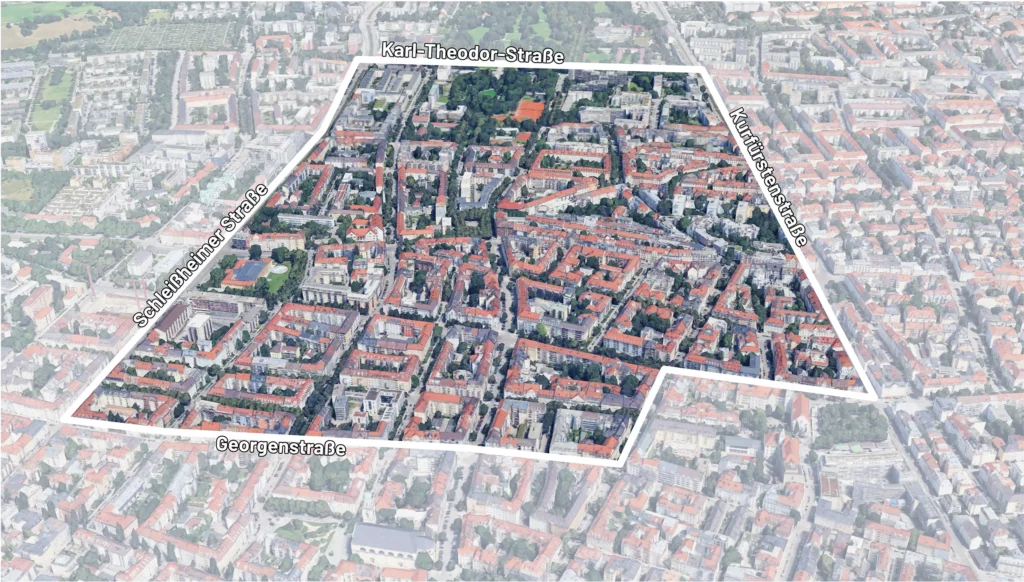
The mobility of tomorrow affects us all. Whether sustainable transport planning, innovative technologies or smart solutions for urban and rural areas - the challenges are many and varied.
Do you have questions about the mobility of the future? Are you facing specific problems in your municipality, your company or your research? Our cluster brings together science, business, society and the public sector to find answers together.
In MOSAIQ, we are interested in the interface between mobility and urban climate. By urban climate, we mean both the climate in the meteorological sense and the climate among ourselves, i.e. how we live together in the city. Specifically, we are addressing this interface by testing and implementing measures in real-world laboratories in two Munich neighborhoods together with citizens that strengthen environmentally friendly forms of mobility, participation and social inclusion as well as quality of stay and climate resilience in the city - for a better quality of air, time and space, and for more social, land and climate justice
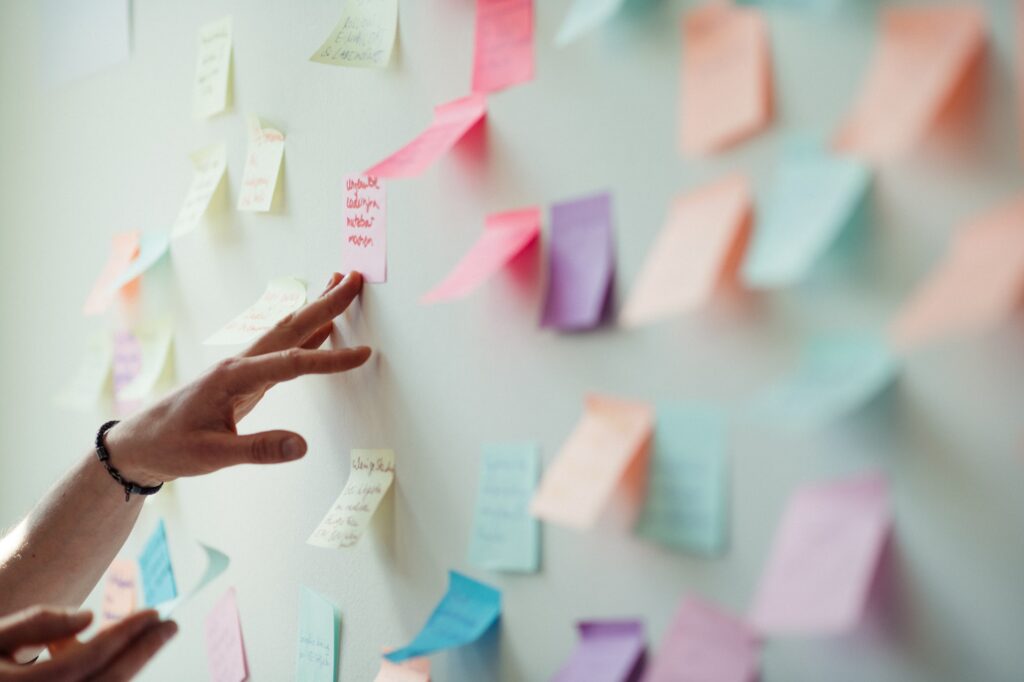
Then come to our on-site appointments! You can find us on the following dates at our dialog point on Hohenzollernplatz:
All people who live in the project neighborhood, work or often spend time there are invited, in our survey to participate. To the residents since October 6 Letters with link and personal participation codes for the online survey distributed. Have a look in your letterboxes to see if you already received a letter from the Technical University of Munich. The letter contains all further details about the survey. If you do not receive a letter from us in your mailbox, please contact us - participation is still possible.
Please bring the invitation with your participation code to the on-site appointment. We look forward to seeing you!
Car or bike, trees or sidewalk cafés, more life or more peace and quiet? How is everyday life in Schwabing-West changing? Our MCube colleagues from Munich University of Applied Sciences from the WiPa integration project are coming to Hohenzollernplatz in September with the Zukünfte Kiosk to collect your ideas for the future of your neighborhood. Come along, share your visions and wishes for the neighborhood of tomorrow and make your images of the future visible to everyone at the kiosk!
The Zukünfte Kiosk can be found on Tuesday, October 14, from 2:30 to 6:30 pm in Schwabing-West at Hohenzollernplatz.
There are currently no new posts
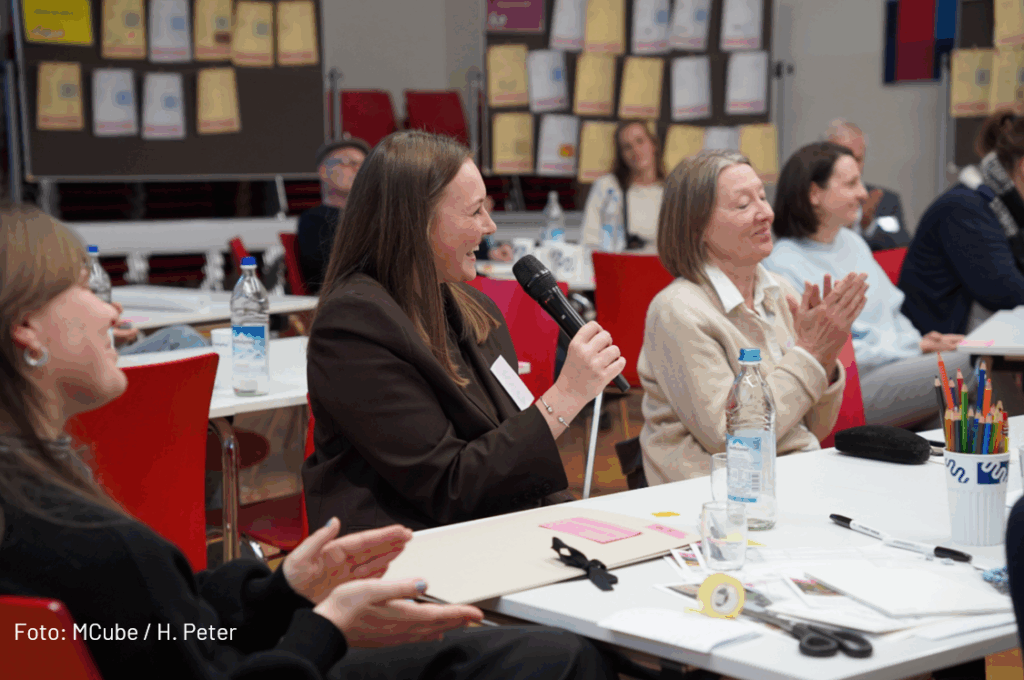
Working together with experts in small groups on exciting project outlines? That was the plan for the day for committed citizens from the MOSAIQ project quarter in Schwabing-West last Saturday (15.11.2025). In the project forge, concrete approaches for the neighborhood were developed from ideas collected in advance in the neighborhood. The project outlines make creative proposals for increasing the quality of life in the neighborhood, for example, or for new mobility solutions and climate adaptation.
The Project Forge is part of the MOSAIQ Ideas Forum. You can find more information about the ideas forum, what happens to the project outlines now and when the project outlines will be exhibited at here.
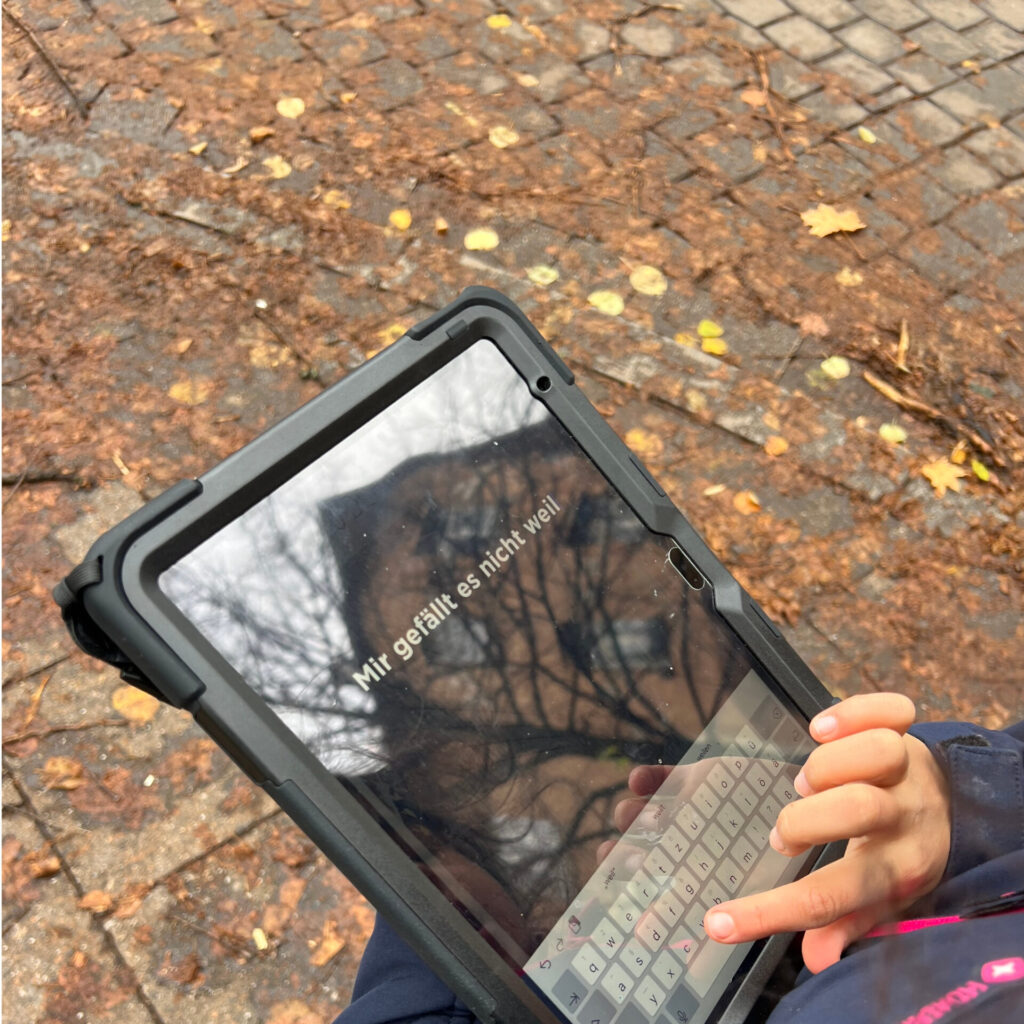
Where do children like to move and where do they like to spend time? Where not and why? Pupils from class 3a at Farinelli elementary school explored these questions with us in the MOSAIQ quarter in Schwabing-West. The children took photos and videos on site, which we then discussed together.
The preliminary results show that the children have many wishes and ideas for the neighborhood, such as fewer parked cars and e-scooters on the sidewalks, more safety on the school and after-school paths and less garbage. It was a great experience for us to learn more about the neighborhood from and with the children. The results are currently being evaluated and will be presented to the public at a later date.
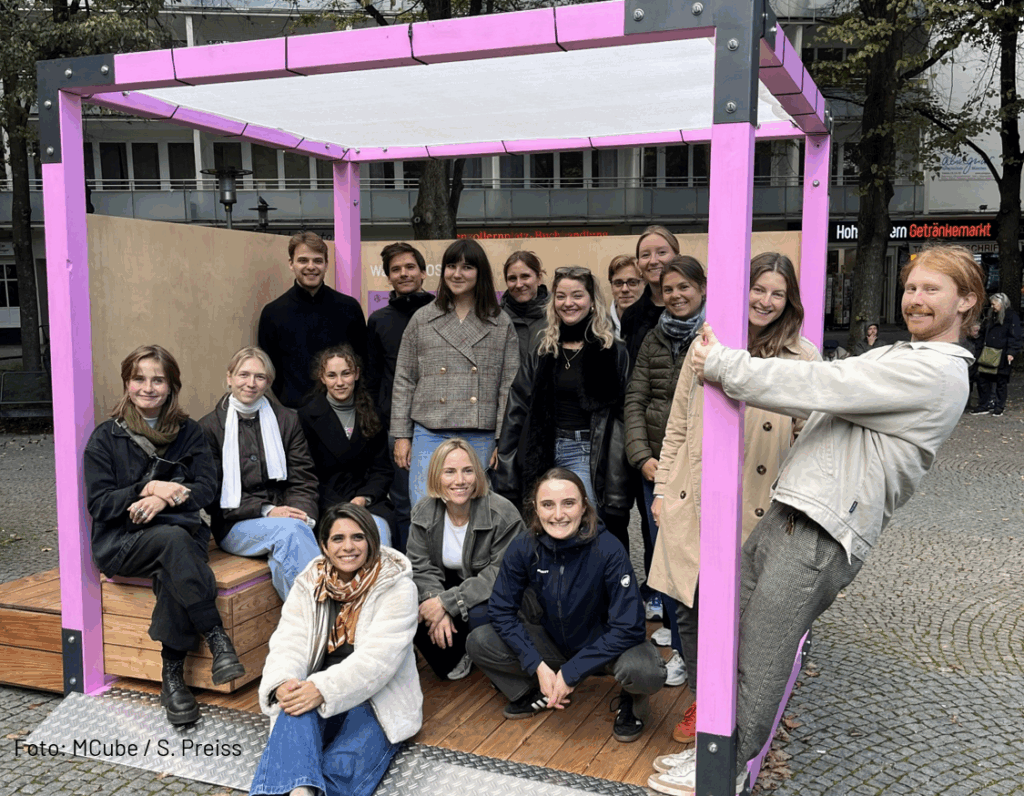
"Just" Streets? What makes roads special? It is clear that they are more than just asphalt and traffic signs. But what use and distribution of public (road) space is fair - and for whom? Students at the Technical University of Munich tackled this question in an intensive interdisciplinary course, the MOSAIQ Winter School, from October 1 to 10, is the focus. The students first studied literature on issues of justice. They then collected and evaluated their own data in the project districts and developed proposals for the "just streets" of the future - from a safe place for young women to stay, a mobile bike kiosk that visits older people in the district and seating for people with limited mobility to highlighting the effects of parking on vulnerable groups. The students are now preparing their findings and recording them in a brochure.
There are currently no new posts
E-Mail: mosaiq@mcube-cluster.com
By telephone: Mondays from 9-11 a.m.
under 01575 - 6400400
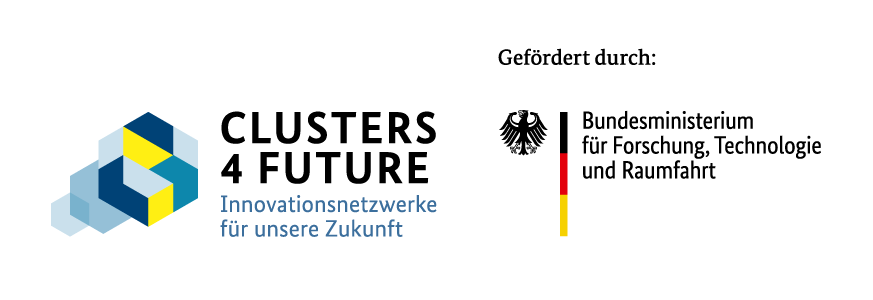
What is MOSAIQ?
Imagine something: There is more space for people. The streets have more trees and plants. Everyone can get around better. That's how your Schwabing-West district could be in the future. How would you like your district to be? We want to talk to you about it!
The project is called MOSAIQ. MOSAIQ is a research∙project. MOSAIQ means: Mobility and urban climate in the future city∙part. The Technical University of Munich is leading the project.
What is MOSAIQ about?
MOSAIQ wants to make the streets in the city∙part more beautiful. People should feel comfortable there. There should be more space. For meetings and plants, for example. You can help decide what is tried out in the Stadt∙teil. The ideas come from you. Some ideas will be tried out on the streets for a certain period of time.
The aim of MOSAIQ is to make urban districts good places to live.
At the same time, the climate in the city should improve. And people should be able to move around the city easily.
What is happening in the district?